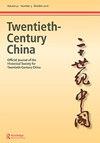The Patriarchy of Diaspora: Race Fantasy and Gender Blindness in Chen Da’s Studies of the Nanyang Chinese
IF 0.4
Q1 HISTORY
引用次数: 3
Abstract
Abstract:This study critically appraises the earliest sociological investigations of Nanyang (South Seas) Chinese communities by the sociologist Chen Da (1892–1975). By exploring Chen’s corpus of work and highlighting systemic blind spots of race and gender, the study reveals the normative rather than empirical quality of his sociological elaboration of the huaqiao (overseas Chinese). Tracing the genesis of his research and his travels through Southeast Asia, it shows that, at each stage, Chen’s investigations, academic networks, connections he made with his local informants, and even his collaborations with his principal translator offered an understanding of the world beyond a patriarchal, patriotic Chinese diaspora that he declined to fully explore. The paper thus offers an intimate window into the historically contingent conceptual work that went into constructing the Chinese “diaspora,” and it highlights the need to exercise caution in making ahistorical use of social science studies of overseas Chinese.散居的父权制:陈达南洋华人研究中的种族幻想与性别盲目性
摘要:本文批判性地评价了社会学家陈达(1892-1975)对南洋(南海)华人社区最早的社会学调查。通过探索陈的作品语料库,突出种族和性别的系统性盲点,本研究揭示了他对华侨(海外华人)的社会学阐述的规范性而非经验性。追溯他的研究起源和他在东南亚的旅行,书中显示,在每个阶段,陈的调查、学术网络、他与当地线人的联系,甚至他与他的主要翻译的合作,都提供了一种超越父权制的、爱国的华侨华人的世界的理解,他拒绝充分探索。因此,本文为构建中国“散居”的历史偶然概念工作提供了一个亲密的窗口,并强调了在非历史地使用海外华人的社会科学研究时需要谨慎。
本文章由计算机程序翻译,如有差异,请以英文原文为准。
求助全文
约1分钟内获得全文
求助全文

 求助内容:
求助内容: 应助结果提醒方式:
应助结果提醒方式:


